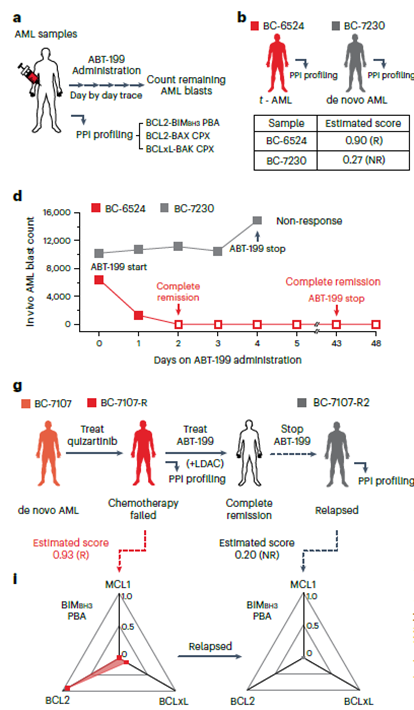SNUH & SNU Develop Biomarkers Predicting Acute Myeloid Leukemia (AML) Treatment
- Development of ‘high-performance companion diagnostic biomarkers’ using single-molecule coimmunoprecipitation technology...Customized treatment becomes possible
- The mechanism of action for ABT-199 was discovered, and it was proved that patient responses to anticancer drugs can be predicted with high accuracy.
- Achieved up to 94% prediction accuracy in vitro, with 100% sensitivity and 83.3% specificity confirmed in a clinical trial.
A joint research team from Seoul National University Hospital(SNUH) and Seoul National University(SNU) has announced a groundbreaking study that suggests the potential for customized treatment for patients with acute myeloid leukemia (AML). The researchers used new technology to clarify the mechanism of action for the ABT-199 targeted anticancer drug and developed a high-performance companion diagnostic biomarker that can accurately predict individual patients' treatment responses. The results of this study were published in the prestigious academic journal, Nature Biomedical Engineering (Impact Factor: 29.2).
On August 6th, Professor Koh Youngil and Professor Byun Ja Min from the SNUH Department of Hemato-Oncology, Prof Yoon Tae-Young and Dr Chun Changju from the SNU School of Biological Sciences, and the joint research team of PROTEINA announced that they have developed a high-performance companion diagnostic biomarker that can predict the therapeutic effect of the ABT-199 targeted anticancer drug by analyzing the interaction between the BCL2 protein and other proteins using the single-molecule pull-down and co-immunoprecipitation (SMPC) technology.

[Figure] PPI profiling data related to protein families were confirmed with blood samples to well predict ABT-199 (Venetoclax) efficacy in leukemia patients.
Acute myeloid leukemia (AML) is a type of blood cancer in which abnormal white blood cells in the blood or bone marrow rapidly proliferate and interfere with the production of normal blood cells. It is very important to select a rapid and effective treatment. BH3 mimetics are drugs that target the BCL2 protein and induce the death of cancer cells. In particular, the targeted anticancer drug ‘ABT-199 (Venetoclax)’ has shown high performance in treating AML.
However, not all patients experience the same effects from treatment, and may develop resistance after temporary remission, so a method to predict the effect of ABT-199 in advance was needed.
The research team developed a technique to quantitatively detect 22 different protein-protein interaction (PPI) signals by analyzing approximately 30,000 cells using single-molecule pull-down and co-immunoprecipitation (SMPC) techniques, along with single-molecule fluorescence imaging. This method enabled precise measurements of how various proteins interact with one another.
The team confirmed that ABT-199 selectively binds to the BCL2 protein and degrades the BCL2-BAX complex. In this process, the activated BAX protein induces the death of cancer cells. Through this experiment, the main mechanism by which ABT-199 kills cancer cells was clearly identified.
The research team acquired multidimensional protein-protein interaction (PPI) profile data from patient samples collected from 32 AML and analyzed the correlation between this data and drug response at the in vitro level. They identified key protein complexes that influence sensitivity (the degree to which a drug is effective) and resistance (the extent to which a drug is resisted) in ABT-199. Notably, they confirmed that the BCL2-BAX complex is associated with the sensitivity of ABT-199, while the BCLxL-BAK complex is linked to resistance.
Using the collected data, the research team developed a high-performance companion diagnostic biomarker that can predict the drug efficacy of ABT-199 in individual patients with acute myeloid leukemia (AML). This biomarker effectively forecasts whether ABT-199 will be effective by monitoring changes in specific PPI signals within the patient's cells.
The research team tested the prediction accuracy of the developed biomarker in vitro. The results showed a prediction accuracy (AUC-ROC) of up to 94%, which satisfies the standard required for clinical application. In a clinical trial targeting 10 actual AML patients, it successfully predicted the anticancer drug response of 9 people, showing a sensitivity of 100% and a specificity of 83.3%. This confirmed that the biomarker can predict the anticancer drug response of patients with high accuracy.
Prof. Yoon Tae-Young (School of Biological Sciences) of SNU said, “The single-molecule pull-down and co-immunoprecipitation (SMPC) technique is a tool that allows for precise measurement of protein-protein interactions (PPIs) in various samples.” He added, “This technology is expected to pave the way for advances in molecular diagnosis by enhancing our understanding of the complex protein interaction network.”
Professor Koh Young-il (Department of Hemato-Oncology) from SNUH said, “This study is a meaningful achievement that highlights the importance of ABT-199 (Venetoclax) therapy in acute myeloid leukemia, where response prediction biomarkers were previously lacking,” and “This study based on PPI profiling will contribute significantly to the development of precision medicine for acute myeloid leukemia in the future.” He explained the significance of the study.

[Pictures from left] Professor Koh Youngil & Prof Byun Ja Min from SNUH Department of Hemato-Oncology,
Prof Yoon Tae-Young and Dr Chun Changju from SNU School of Biological Sciences